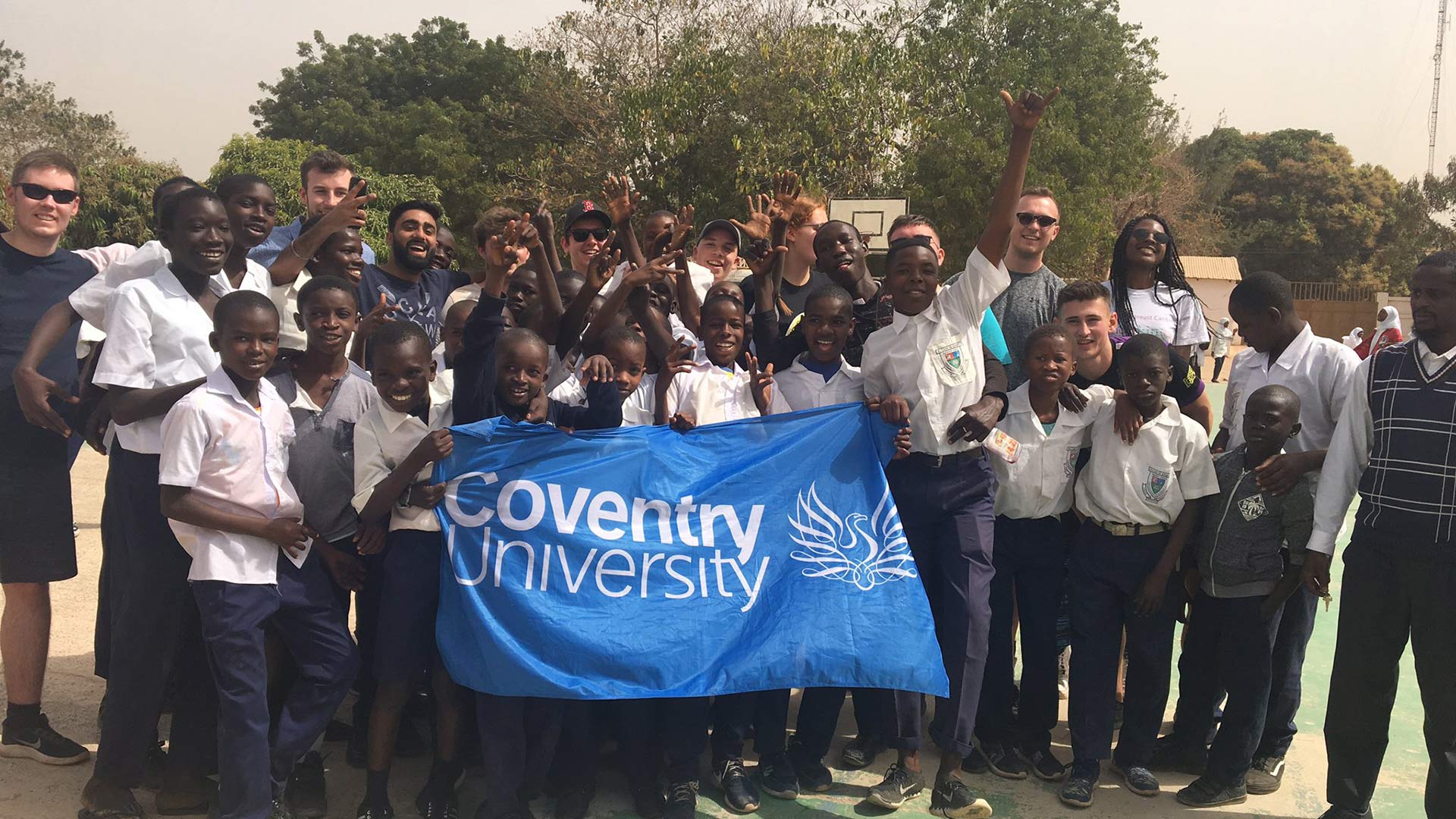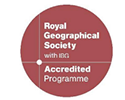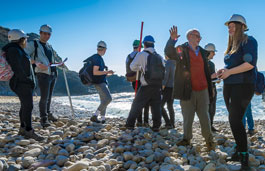Search
Geography BA (Hons)
Study level: Undergraduate
This BA Geography course will cover the comprehensive understanding of the complex reciprocal relationships between human societies and the physical components of the Earth.
Course features
Year of entry
Location
Coventry University (Coventry)
Study mode
Full-time
Part-time
Sandwich
Duration
3 years full-time
4 years sandwich
6 years part-time
Course code
L700
Start date
September 2025
The information on this page is for 2024-25 entry and should be used as guidance for 2025-26 entry. Please keep checking back on this course page to see our latest updates.
Course overview
The aim of this course is to provide you with experiential learning and field work to develop an applied knowledge and critical understanding of human environments and society.
- You will understand the evolution and significance of the distinctiveness of places, and the inter-relationships between people and the environment.
- You will have opportunity to learn about how diverse communities interact with pressing socio-economic, geo-political and environmental concerns, such as climate change, poverty, social exclusion, population growth and sustainable living in a competitive global economy.
- The course is designed to equip you with core knowledge, skills and expertise within the broad field of geography, together with a range of analytical abilities and transferrable professional skills to secure employment on successful graduation.
Joint Top Modern University for Career Prospects
Guardian University Guide 2021 and 20225 QS Stars for Teaching and Facilities
QS Stars University RatingsTop 5 UK Student City (Coventry)
QS Best Student Cities Index 2023Why you should study this course
- The BA Geography course has fieldwork embedded at every level, including at least one mandatory residential field trip to enhance your applied geographical skills2.
- We aim for you to experience international mobility at least once during your studies through a mandatory international field trip. You will be required to contribute to the costs of the mandatory international field trip, the precise amount of which will vary year to year and be dependent on location and the availability of university subsidies. See fees and funding section for more details.
- There is a strong career/employability focus throughout the course, which is manifested in the four-year sandwich degree, where the third year offers the option of a year in industry or study abroad, based on our long experience of organising placements with a wide range of professional contacts2.
- You will acquire basic capabilities in Geographical Information Systems (GIS), a key skill sought by many employers. All students receive a certificate of GIS training on successful completion of an appropriate exercise.
- Students will also utilise the Simulation Centre, which enables geographical and environmental phenomena to be visualised in a safe setting that allows students to grasp issues and implications. This unique aspect of studying geography at Coventry facilitates an experience of fieldwork, research methods and hazard simulation, all within a monitored and recorded environment that allows students to develop skills, receive immediate feedback on their development and prepare for the transition into the workplace after graduation4.
Accreditation and professional recognition
This degree is accredited1 and recognised by the following bodies:

Royal Geographical Society (with IBG)
This programme has been accredited by the Royal Geographical Society (with IBG). Accredited degree programmes contain a solid academic foundation in geographical knowledge and skills, and prepare graduates to address the needs of the world beyond higher education. The accreditation criteria require evidence that graduates from accredited programmes meet defined sets of learning outcomes, including subject knowledge, technical ability and transferable skills.
What you'll study
This course has a common first year.
The common first year enables you to work alongside students doing similar courses to you, to widen your knowledge and exposure to other subject areas and professions. You will have the opportunity to collaborate with other students, so you can share your insights and experience which will help you to develop and learn.
If you discover an interest in a specific subject you have studied, upon successful completion of your first year, you could swap degrees with another course in your common first year (subject to meeting progression requirements).
Common first year courses
- Geography BSc (Hons)
- Geography and Environmental Hazards BSc (Hons)
We regularly review our course content, to make it relevant and current for the benefit of our students. For these reasons, course modules may be updated.
How you'll learn
You will be taught by experienced, qualified teaching staff who bring professional and research expertise into their teaching. Field trips, which occur each year, provide an opportunity to contextualise classroom-based learning and develop practical skills through real-life application. In addition to the residential field trips, you will have the opportunity to undertake a range of day trips to gain practical experience of applying your knowledge2.
This course can be offered on a part-time basis. Whilst we would like to give you all the information about our part-time offering here, it is tailored for each course each year depending on the number of part-time applicants. Therefore, the part-time teaching arrangements vary. Request further information about part-time study.
Teaching contact hours
We understand that everyone learns differently, so each of our courses will consist of structured teaching sessions, which includes:
- On campus lectures, seminars and workshops
- Group work
- Self-directed learning
- Work placement opportunities2.
The number of contact hours may vary from semester to semester, however, on average, it is likely to be around 14-15 contact hours per week in the first and second year dropping to around 11 contact hours per week in the final year as you become a more independent learner.
As an innovative and enterprising institution, the university may seek to utilise emerging technologies within the student experience. For all courses (whether on-campus, blended, or distance learning), the university may deliver certain contact hours and assessments via online technologies and methods.
Since COVID-19, we have delivered our courses in a variety of forms, in line with public authority guidance, decisions, or orders and we will continue to adapt our delivery as appropriate. Whether on campus or online, our key priority is staff and student safety.
Assessment
This course will be assessed using a variety of methods which will vary depending upon the module.
Assessment methods can include:
- Formal examinations
- Phase tests
- Essays
- Group work
- Presentations
- Reports
- Projects
- Coursework
- Exams
- Individual assignments
- Laboratories
The Coventry University Group assessment strategy ensures that our courses are fairly assessed and allows us to monitor student progression towards achieving the intended learning outcomes.
International experience opportunities
Geography is a global subject and international themes are core to our teaching. As such, much of our teaching relies on the use of case studies from around the world; your lecturers will often draw on examples related to their research, such as child-headed households in post-conflict Rwanda (Staff may be subject to change).
There are exciting international field trips in your second and final year. Our students have previously had the opportunity to visit Berlin to explore themes such as memory, conflict and reconciliation. Final year students have previously had the opportunity to explore The Gambia in West Africa to experience first-hand the workings of village communities and the challenges they face in education and health. Students were given strategic briefings by government officials, investigate the relationship between trade, aid and development and conduct fieldwork in rapidly urbanising environments throughout the duration of this trip2.
Entry requirements
Typical offer for 2024/25 entry.
Fees and funding
| Student | Full-time | Part-time |
|---|---|---|
| UK, Ireland*, Channel Islands or Isle of Man | 2025/26 fees TBC 2024/25 fees - £9,250 per year |
Request fee information |
| EU | 2025/26 fees TBC 2024/25 fees - £9,250 per year with EU Support Bursary** 2025/26 fees TBC 2024/25 fees - £19,850 per year without EU Support Bursary** |
Not available |
| International | 2025/26 fees TBC 2024/25 fees - £19,850 per year |
Not available |
If you choose to study this course with a professional placement2 or study abroad year, you will need to pay a tuition fee3 of £1,250 to cover your academic support throughout your placement year.
For advice and guidance on tuition fees and student loans visit our Undergraduate Finance page and see the university’s Tuition Fee and Refund Terms and Conditions.
The university will charge the tuition fees that are stated in the above table for the first Academic Year of study. The university will review tuition fees each year. For UK (home) students, if Parliament permits an increase in tuition fees, the university may increase fees for each subsequent year of study in line with any such changes. Note that any increase is expected to be in line with inflation.
For international students, we may increase fees each year, but such increases will be no more than 5% above inflation. If you defer your course start date or have to extend your studies beyond the normal duration of the course (e.g. to repeat a year or resit examinations) the university reserves the right to charge you fees at a higher rate and/or in accordance with any legislative changes during the additional period of study.
We offer a range of International scholarships to students all over the world. For more information, visit our International Scholarships page.
Tuition fees cover the cost of your teaching, assessments, facilities and support services. There may be additional costs not covered by this fee such as accommodation and living costs, recommended reading books, stationery, printing and re-assessments should you need them.
The following are additional costs not included in the tuition fees:
- Any optional overseas field trips or visits: £400+ per trip.
- Any costs associated with securing, attending or completing a placement (whether in the UK or abroad).
Find out what's included in your tuition costs.
Other additional costs
- Mandatory international field trips: Typically between £200 and £400 per trip
*Irish student fees
The rights of Irish residents to study in the UK are preserved under the Common Travel Area arrangement. If you are an Irish student and meet the residency criteria, you can study in England, pay the same level of tuition fees as English students and utilise the Tuition Fee Loan.
**EU Support Bursary
Following the UK's exit from the European Union, we are offering financial support to all eligible EU students who wish to study an undergraduate or a postgraduate degree with us full-time. This bursary will be used to offset the cost of your tuition fees to bring them in line with that of UK students. Students studying a degree with a foundation year with us are not eligible for the bursary.
Facilities
The faculty’s £50m Engineering and Computing Building and new £25m Beatrice Shilling Building are designed to support hands-on learning. Our Sir John Laing Building also houses a variety of industry-standard labs and equipment4.
- Geotechnics Laboratory - Contains triaxial cells, direct shear box apparatus, a dimensional compression oedometer, California Bearing Ratio apparatus, soil classification equipment and Marshall test apparatus for asphalt mixes.
- Computer Laboratory - This computer laboratory is equipped with access to ArcGIS for mapping and geographical information systems. It is also equipped with Petrel/Eclipse software for oil and gas reservoir simulation and calculation.
- Informal Study Areas - Our open access spaces provide you with informal computer access to all the specialist software required for your studies. There are bookable spaces where you can meet with academics or work in small groups.
Careers and opportunities
On successful completion, you will have knowledge of:
- The nature, practical value and application of human geography and its concepts, methods and techniques.
- The constitution and character of space, place and landscape.
- Concepts of spatial and temporal scale, variation and change in the human and physical worlds.
- Reciprocal relationships between physical and human aspects of environments and landscapes.
- Patterns, processes and consequences of uneven development, difference and inequality.
- The relationship between place, society and culture.
- Nature, mitigation and management of contemporary environmental problems and hazards.
- Plan, design and execute a piece of rigorous research or enquiry using appropriate methods and strategies of acquiring, interpreting and analysing information.
- Conduct field and laboratory work effectively utilising data collection and associated investigative and analytical skills.
- Recognise the moral and ethical issues involved in debates and inquiries.
- Think critically and analytically about the world around you.
- Show awareness of how skills and training can be applied to work of a geographical nature.
- Observe, contextualise and analyse information through field and laboratory studies (including computational).
- Demonstrate a range of transferrable professional skills including intellectual and problem-solving skills; effective teamwork; initiative and responsibility for your own learning and development; self-reflection; time management and personal organisation, including working to deadlines and excellent communication skills, both orally and in writing.
Successful geography graduates should possess a range of skills that are highly valued by employers. They should be literate and numerate, experienced in solving complex problems and developing solutions for multiple stakeholders through the collection and analysis of information. As such, excellent employment prospects should be available to graduates.
Where our graduates work
Recent examples of graduate employers include Transport for London; KPMG; Barclays Bank; Grays Travel; Parsons Brinckerhoff; Football in the Community; Urban and Transport Planning; Network West Midlands; non-governmental organisations (NGOs) such as Concern Universal; and various graduate training schemes, including that of the Civil Service.
Further study
You may be entitled to an alumni discount on your fees if you decide to extend your time with us by progressing from undergraduate to postgraduate study.
Graduate Immigration Route visa
Based on current information from the UK Government, international students whose study extends beyond summer 2021 may be eligible for a visa under the UK Government’s Graduate Immigration Route, which will enable students to stay and work, or look for work, in the UK at any skill level for up to two (2) years. Check the most up to date guidance available to check your eligibility and any updates from the UK Government before making an application or enrolment decision.
How to apply
You may also like

Geography BSc (Hons)

Geography and Environmental Hazards BSc (Hons)




